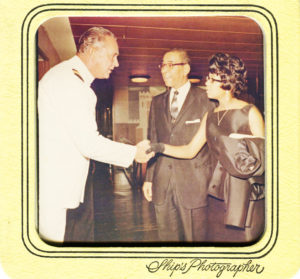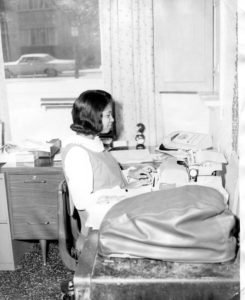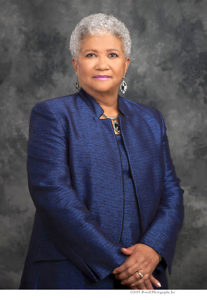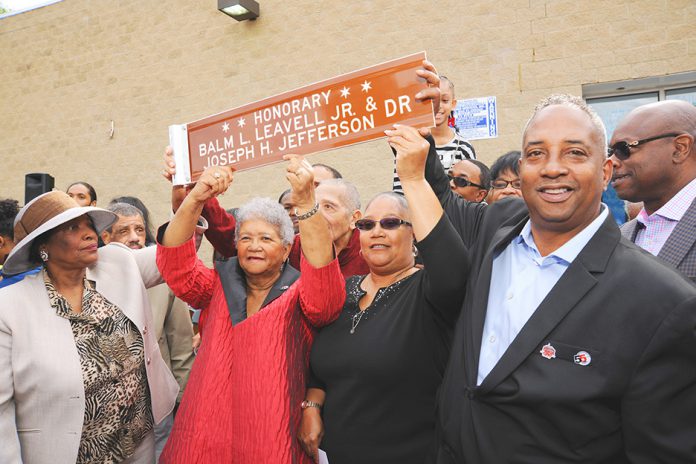In 1968 she became a Black single mother who was left to run two newspapers in a male-dominated industry; now after decades of challenges, Dorothy R. Leavell celebrates 50 years as publisher of Crusader newspapers
By Erick Johnson, Chicago Crusader
1968 was a bad year. Major cities were on fire following the assassination of Dr. Martin Luther King, Jr. in Memphis. Robert F. Kennedy was killed two months later in California as he came closer to winning the Democratic nomination for president. In Chicago, thousands of protesters in August were roughed up outside the Conrad Hilton Hotel where the Democratic National Convention was held.

Two months later, Balm L. Leavell, Jr., the man who co-founded the Chicago Crusader in the Ida B. Wells housing project, died after a short illness at Michael Reese Hospital.
Dorothy R. Leavell, once his feisty partner and loyal wife, was now a Black single mother with two children and two newspapers to run.
Half-a-century later, after rising above a male-dominated industry and surviving decades of challenges in a declining print industry, 2018 marks Leavell’s 50th year as publisher of the Chicago and Gary Crusader newspapers—two historic, family-owned Black publications that together are 135 years old.
The force behind this small empire is Leavell, a tireless, hands-on publisher who has stared down politicians, businessmen and anyone who dares to take her on. When it comes to addressing issues in the community, she has as many enemies as she has friends, but this year, Leavell is in the spotlight at the 24th Annual Black Women’s Expo at McCormick Place.
The Chicago Crusader booth pays a special tribute to Leavell’s 50th anniversary as a publisher who took her crusade national as chairman of the National Newspaper Publishers Association, a.k.a. the Black Press, which includes more than 200 Black newspapers across America.

Through it all, Leavell has remained grounded in her purpose as an enduring advocate and activist in the Black community.
At a time when many historic small Black newspapers are closing their doors, Leavell’s newspapers are pressing on in difficult times. The Gary Crusader, which was founded in 1961, is the only Black newspaper that remains in that predominately Black city.
The Chicago Crusader has broadened its coverage of Chicago’s rich, but forgotten Black history, while publishing investigative, original stories that are attracting a new group of readers. It’s a strategy that’s helping the Crusader stay relevant and fresh in an industry that is declining in the digital age of the internet.
Currently, Leavell is working to boost her newspapers’ presence on social media in order to connect to a younger generation of readers. But unlike many contemporary publishers, she continues to invest her time and energy in producing the print edition of her newspapers. She believes they are still important and powerful in maintaining the soul and identity of the publications.

“Black newspapers are the largest Black communication medium,” Leavell said. ”There are about 200 Black newspapers and about a dozen Black-owned radio stations. Without Black newspapers, we will not have the first of line of defense in telling our story.”
She was born in the mid-1940s on October 23, in the small town of Pine Bluff, AR. When she was 15, Leavell visited an aunt in Chicago, and her aunt’s friend who had a tenant working for the Chicago Crusader suggested Leavell get a summer job at the newspaper.
In 1959, they went to see Lorraine Hansberry’s play, “A Raisin in the Sun.” There, they ran into Balm Leavell, who, along with Joseph H. Jefferson, founded the newspaper in 1940. Leavell offered Dorothy and her friend a ride home; she did not know that he was the publisher of the newspaper. During the ride home, Dorothy blabbed all about what she was going to do at the newspaper. When they got out and her friend told Dorothy who their driver was, Dorothy said she “almost died.”
Bold and undaunted, Dorothy went in for the summer job interview anyway. Two people had called in sick that day and Balm needed help. He hired Dorothy for $35 a week as a bookkeeper.
Chicago was a new world to the small-town girl from Arkansas.
“Chicago was exciting,” Dorothy said. “I was extremely attracted to the fact that the city was so well-lit. Where I lived, you couldn’t see your hand at night. The excitement in this city just attracted me to stay. I just knew this is where I wanted to live the rest of my life.”
Dorothy would work during the summer for the Crusader for the next several years before she graduated as valedictorian from Pine Bluff’s Merrill High School in 1962. She then moved to Chicago to work for the Crusader full-time. In 1963, she and Balm were married by Rev. Jesse Jackson. In 1964, their first child, Antonio, was born. In 1966, they had a daughter, Genice. Dorothy took just two weeks of maternity leave before she was back at the newspaper.
In 1968, Balm became ill with pancreatic cancer. He was in and out of the hospital, but just two days after celebrating Dorothy’s 24th birthday, Balm Leavell died at Michael Reese Hospital. His funeral was attended by Mayor Richard J. Daley and dozens of dignitaries who packed the First Church of Deliverance in Bronzeville. Balm was buri- ed in Lincoln Cemetery, which was then the preferred burial site for Chicago’s well-to-do Blacks.
Balm’s children from another marriage did not want Dorothy to have control of the Chicago and Gary Crusader, but Crusader co-publisher, Joseph H. Jefferson, had the majority interest in the company and threw his weight behind Dorothy in selecting her to succeed her husband as publisher.

Dorothy became the only Black woman publisher in Illinois and Indiana.
At the time, Chicago Defender publisher, John H. Sengstacke, and Ebony and Jet publisher, John H. Johnson, were fierce competitors. Like the late Katherine Graham of the Washington Post, Dorothy would often attend board and corporate meetings with male executives. Some of them were Black, but many were white advertising and marketing executives.
“It has not been easy being a woman publisher. People lacked confidence in women. Most male publishers didn’t respect me, but you need the business people for advertising or the paper can’t survive. I had to establish that I was serious.”
Leavell said she lost some advertisements after turning down invitations for dates. But as a widow with children that were 2- and 3-years- old and with two Black newspapers to run, she had a big job ahead of her as a Black woman publisher. At 24, she was the youngest employee from both the 78-year-old Chicago Crusader and 57-year-old Gary newspaper. The Crusader would be the only employer Dorothy would work for her entire life.
After her husband died, Dorothy implemented some changes at both newspapers. She toned down what she believed were sensational headlines Balm used. She also boosted local news coverage in Gary, where there were stories on Chicago that drew complaints from readers.
At one time, Gary had three Black newspapers, but the Gary Info and the Gary Defender—part of the Chicago Defender media chain—eventually closed. The Post Tribune moved out of Gary after whites fled the city when Richard Gordon Hatcher became mayor.
Despite declining advertising revenue, the Gary Crusader is the last Black newspaper in the city. In 1976, Dorothy relocated the Gary newspaper to its current space at 1549 Broadway, which was once a fish market.
What does the future hold for the Crusader newspapers?
“I’m working hard to find someone who has the interest and passion to carry on the Crusader,” Dorothy said. “I didn’t have the passion for this business at first, but after years of service, I realized how important the Black Press is today, just as it was 191 years ago.”





